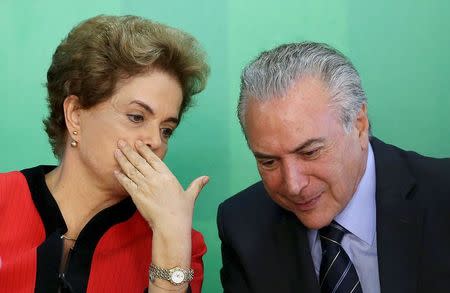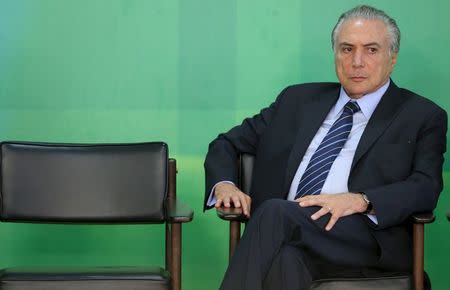Brazil justice orders impeachment process for VP, heightens crisis
By Alonso Soto and Anthony Boadle BRASILIA (Reuters) - A Supreme Court judge ordered Brazil's Congress on Tuesday to start impeachment proceedings against Vice President Michel Temer, deepening a political crisis and uncertainty over leadership of Latin America's largest country. Justice Marco Aurelio Mello told the lower house to convene an impeachment committee to consider putting Temer on trial on charges he helped manipulate budget accounting as part of President Dilma Rousseff's administration. Another committee is already analyzing similar charges against Rousseff, a leftist who is scrambling for support to defeat an impeachment vote in the lower house as early as mid-April. Mello, who has a record of controversial decisions that later have been overturned by the full court, criticized the shelving of a request to impeach the vice president by lower house Speaker Eduardo Cunha, who in December launched impeachment proceedings against Rousseff on the same grounds. Cunha said he will appeal against Mello's unprecedented ruling, which raises questions about the future governance of a country mired in political turmoil, a severe economic recession and an institutional crisis that is increasingly being handled by the judiciary. Because Temer is next in line for the presidency if Rousseff was impeached, the possibility of his ouster complicates the calculation that lawmakers must make if they vote to oust Rousseff. If one is guilty of the charges, the ruling suggests, the other is guilty too. "This takes away some of the momentum for her impeachment," said Sonia Fleury, a political scientist at the Getulio Vargas Foundation, a business school and think tank in Rio de Janeiro. "Her opponents will now have to rethink their strategy." Fleury said it is unlikely, however, that the 11-member court will reverse Mello's decision. Brazil's currency, the real , extended losses following the ruling, frustrating investors who hope a Temer administration would be more market-friendly and pull the economy out of what could be its worst recession in a century. Cunha, a party colleague of Temer's and the third in line for succession, is himself embroiled in a corruption scandal related to the kickback probe around state-run oil company Petrobras and faces ethics committee hearings. Temer on Tuesday stepped aside as the head of the Brazilian Democratic Movement Party (PMDB), the large, ideologically amorphous party that until last week was the main coalition partner for Rousseff's Workers' Party. By stepping down, analysts said, Temer removed himself from the awkward position in which his party has been questioning the legitimacy of a Rousseff government that he is still part of. "Temer is trying to distance himself from the PMDB to avoid accusations of influencing political decisions aimed at destroying president Rousseff," said Augusto de Queiroz, a political scientist with Brazil's congressional research service. Temer's resignation and Mello's ruling that he should be subject to impeachment proceedings further muddied the waters of Brazil's crisis and made it harder to predict how and indeed whether Rousseff's opponents will succeed in unseating her. Consultancy Eurasia said Rousseff's impeachment was still likely but cut the odds to 60 percent from a 60-70 percent range. "It is becoming a bit more difficult to anticipate the precise manner in which Rousseff will fall," Eurasia said on Tuesday in a note to clients. The impeachment committee will decide on Monday whether Rousseff committed an impeachable crime, and its recommendation is expected to sway lower house lawmakers who are still undecided. If impeachment fails to get two thirds of the votes in the lower chamber, some of Rousseff's opponents hope Brazil's top electoral court will annul her election for allegedly being funded by Petrobras bribe money. That would also oust her ticket partner Temer. One of Temer's closest aides, PMDB Senator Valdir Raupp, proposed on Monday that Congress call a snap presidential election in October to end Brazil's political impasse. Others have echoed the suggestion. On Tuesday, Rousseff made light of that possibility, suggesting lawmakers themselves agree to end their terms early. Rousseff has repeatedly denied that she doctored Brazil's budget to hide a massive deficit before her 2014 re-election and has gained ground politically by repeating in almost every speech that what she says is her groundless impeachment is the equivalent of staging a coup d'etat against a democratic government. Rousseff, who is negotiating the support of smaller parties in return for government jobs vacated by the PMDB, said she would not announce a new Cabinet until after the impeachment vote expected in about 10 days. (Additional reporting by Lissandra Paraguassu; Editing by Guillermo Parra-Bernal, Andrew Hay and Leslie Adler)




